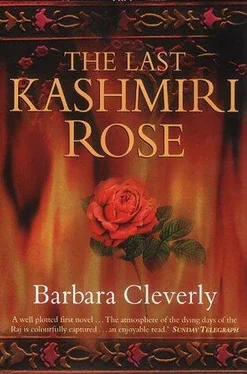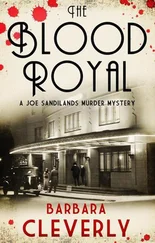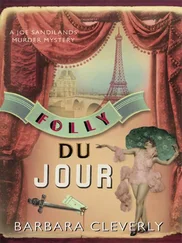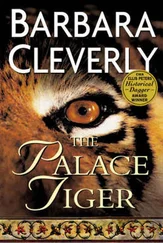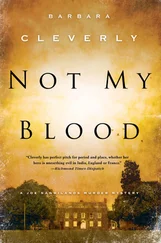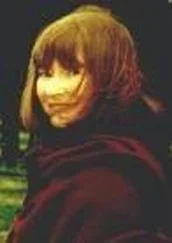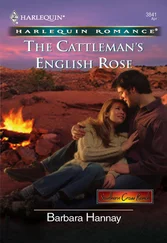‘You’re mad,’ said Joe. ‘You are mad. This is madness! Dementia!’
‘Mad? You may say mad, you may believe mad but – Chedi Khan was the love of my life. He was clear and he was clean. He was beautiful. He loved me and I loved him. I would have done anything for him. I could think of nothing that would more fulfil my life than to have been allowed to die for him. He filled me with joy, he filled me with hope, he filled me with promise for a life that would have opened before us, but, as it is, and through their neglect, he died with a drunken woman in his arms, alone and in anguish! How should I forgive those who took this away from me? He made my heart sing! It was many months before I could bring myself to believe that he was gone and the years have not softened my loss.’
Joe listened, aghast.
‘More Pathan than the Pathan.’ Again it was Kitty’s voice he heard. And here before him was a tribesman, ruthless, inflexible, convinced of the rightness of his conduct. His aquiline profile, his dark eyes hooded and watchful, made a nonsense of the cultured English accent.
‘And you learned to think like this – like a Pathan – in your infancy?’ said Joe. ‘As they say: “As the twig is bent, so will the tree grow.” Distorted. Forever distorted.’
‘Still the policeman! Minutes from death, Sandilands, and you’re still trying to understand.’ He smiled pityingly. ‘And again failing utterly!’
He paused, wondering, Joe feared, whether to shoot him dead out of boredom and have done with it or to succumb to the urge he had seen so often in killers, an urge to explain themselves. To make someone, even the arresting officer, aware of their compulsions. They work in solitude, they cannot confide in anyone, cannot justify their actions and, the moment they are discovered, they have an uncontrollable need to pour out their story. He gambled on this same need in Prentice.
‘No wonder people took you for an Indian,’ he said. ‘You’re very familiar to me – we’ve had several conversations – but even I would find it hard to distinguish you from a real native…’
Prentice gave a short bark of derision. ‘Clod!’ he spat out. ‘You don’t see it, do you? You’re as perceptive as that crass Superintendent Andrew keeps in office. The unseeing idiot interviewed me twice and each time he could see no further than a brown skin, a layer of saffron and ash, a caste mark and a turban. I am Indian! Half Indian to be precise. My father was English and my mother, my real mother, was Pathan, a Pahari from the mountains.’
Joe gaped at him in astonishment. What had Naurung senior said about his interview with the ferryman? ‘He was Indian, sahib, to the soles of his feet.’
With an impatient gesture, Prentice shook one sleeve of his baggy shirt down to his armpit, revealing a muscular brown arm. ‘No need for dye! I can appear naked before any Englishman and all he sees is an Indian. It was easy to get close to those stupid, unseeing Englishwomen. For them a brown man is a sight to make them avert their eyes, less important than a piece of furniture.’
The tone was bitter and Joe instantly seized on this. ‘You have no liking, I think, for memsahibs? You showed your victims no pity, in fact I would say that you took considerable satisfaction in killing them.’
‘No liking? I loathe them. You probably know that it is the charming English tradition for a gentleman to put aside his Indian mistress when he at length marries? When my father married a woman fresh from England, he cast my mother off though he continued to visit her. The Englishwoman, fulfilling his requirements in all other respects, did not have the children he wanted her to have. I was born to my Pathan mother and my father had the cruel notion of making his wife acknowledge me as her own. We were stationed at a very remote outpost of the far north-west and there were few to know and none to tell about his deception. My real mother was made to appear as my ayah and I grew up at her side, loving her and loving the Pathan way of life. My English mother hated me, naturally, and went out of her way to make my life uncomfortable. Indeed, she was most ingenious in her cruelties.’
‘ “Give me a child for the first seven years of his life and he is mine for ever.”-’ Joe quoted. ‘Who said that? The Jesuits, was it? And, equally, hatreds and fears acquired during those tender years would affect your life ever after.’
‘Who are you quoting? Freud? Jung? Sandilands? Spare me the psychology! I will simply say that Englishwomen with their white faces, their sharp tongues and their idle ways became anathema to me.’
‘But you married Dolly?’
‘I took a wife to further my career, Sandilands.’
‘And Midge?’ Joe hardly dare ask.
‘Oh, I think… no, I’m quite sure… that she is my daughter if that’s where you’re leading. But the child Dolly was carrying when she died… well, who knows?’
‘But the women that you killed,’ said Joe, desperately, ‘each in a different way and each in a manner that would be most terrifying to her…?’
‘And, again, you forget Chedi Khan! We pulled him out of a blazing village and the fear of fire remained with him to the end of his days…’
A picture came into Joe’s mind of the rows of fire buckets lining the corridor of the burned bungalow. Not to calm Dolly’s fears but Chedi Khan’s.
‘… and, at the last, it was fire that caught him. I think every day of what it must have cost him, the terror he must have felt as he turned back and fought his way through the flames to try to save – what? – a drunken, worthless Englishwoman!’
‘But Midge – Prentice, you must know that from that night twelve years ago, the fear of fire has been strong in Midge’s heart! You have pity for Chedi Khan and his terror, can’t you feel the same emotion for Midge?’
‘I close the circle,’ said Prentice again. ‘It is just. It has to be. She won’t be alone. My work is done and I will go with her.’
At this last chilling declaration Joe gave up all hope. At last he understood. There was no reason he could use, no persuasion, no bargaining with a fanatic who had decided to kill himself.
For some time he had been aware of slight sounds in the house behind him. Joe had raised his own voice in an attempt to cover them. Could Midge have regained consciousness? Was she listening? If so she would understand what was going on and run for help. Perhaps she would come into the room? Even that might provide just the distraction Joe needed. Such was the intensity of his thought, Prentice had been unaware of the sounds. But now he fell silent, the silence which precedes violent action. ‘ “The dreary, doubtful hours before the brazen frenzy starts”,’ thought Joe but in this case not hours so much as seconds. To cover any further sounds, Joe leapt to his feet as though in acute distress, and began to yell wildly at Prentice.
‘You bastard!’ he screamed. ‘You’d murder your daughter, and carry that as a curse through all eternity?’
The muzzle of the Luger followed Joe’s movement, trained on his abdomen.
‘You may call it murder…’
A figure appeared in the doorway. A figure holding a.22 Smith and Wesson target pistol.
Nancy rested the barrel across her left forearm and fired.
The bullet hit Prentice in the shoulder and spun him round. His gun jerked from his grip, slid across the desk and clattered to the floor on the far side. She fired again but the bullet went wide. She fired a third time, hitting him squarely in the chest. A gout of blood spewed from his mouth and trickled down his white shirt.
Joe kicked the Luger to the far side of the room, drew his own pistol covering Prentice and began, ‘Giles Prentice, I arrest…’
Читать дальше
